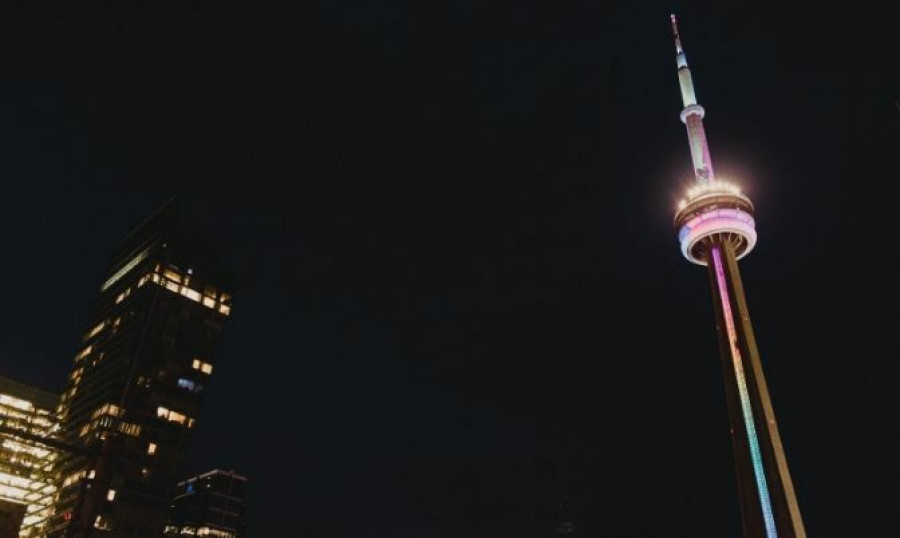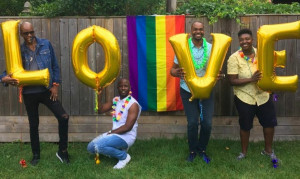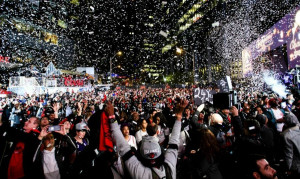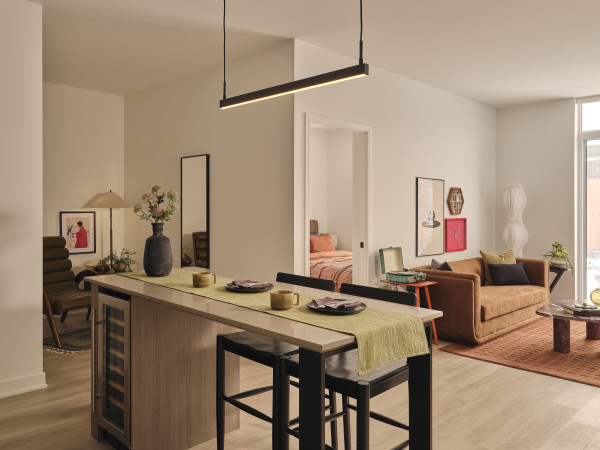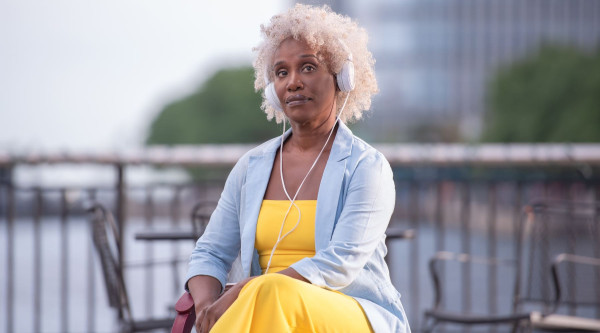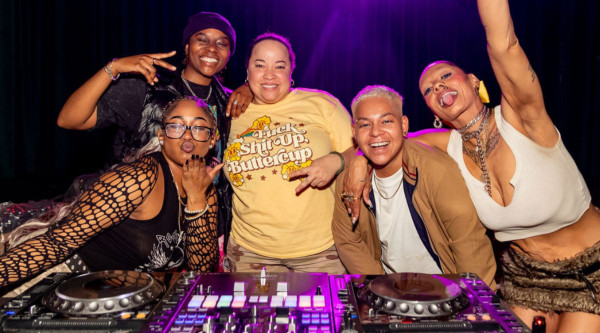The root of this has been both to create family and community among people further marginalized from mainstream trans and queer spaces due microaggressions and anti-Blackness, and protect from transphobia and homophobia within different Black, pan-African, and Caribbean communities. Here are some of the spaces, events and people who have positively shaped my own experience in Toronto’s TLGBQ community.
Blockorama
Blockorama is always the best and most exciting part of my Pride every year. It is the default of my Sunday and is a Black trans and queer family reunion like no other. Blockorama has always been a space where you can bring your Blackest, most queer self and be loved, appreciated, seen, and valued. In 1999, seven of our many trailblazers fighting for Black visibility in Toronto’s trans and queer community created Blockorama, also known as “Blocko.” These seven trailblazers are Nik Redman, Angela Robertson, Junior Harrison, Doug Stewart, Jamea Zuberi, Dionne Falconer, and Courtney Macfarlane. Blocko was a space designed to highlight and centre local Black trans and queer artists who often faced different forms of anti-Blackness among the wider and predominantly white TLGBQ community. Performances at Blocko are always wide ranging; including drag kings and queens, singers, twerk competitions, Dancehall battles, and, of course, legendary vogueing performances to name a few.
Blocko is the most well populated and longest running stage out of all Toronto Pride stages and is currently at the Wellesley Stage – the parking lot across from Wellesley station. In the past, Pride Toronto has under-funded Blocko on a yearly basis and pushed it to smaller spaces so they could use the space for a Pride beer garden. I remember Blocko being pushed to the tiny parking lot of The Beer Store at Church/Wellesley many years ago. It was so hot and overcrowded that three people had fainted and needed immediate emergency intervention. It left a dent in the joy and excitement that is Blocko, which should have been afforded the bigger space for the safety of the large crowd size. After that, Blocko spent a few years at George Hislop Park – on the northern most tip of the Pride Toronto boundaries. It was larger than The Beer Store parking lot but far away from the energy of everything in the centre of the Pride boundaries. Still, the parties continued with a large number of attendees and the high energy of Blocko organizers and performers.
For the last few years, Blocko has been back at the Wellesley Stage and has headlined artists such as Destra, Alison Hinds, SWV, Keisha Chante, and more. This Pride, Big Freeda – the face of New Orleans Bounce – will be gracing Blocko’s headlining space. There will also be performances from the Toronto Kiki Ballroom Alliance and much more.
Black Queer Youth
Black Queer Youth (BQY) is a group program which runs out of Sherbourne Health in downtown Toronto. BQY was created as a response to Black trans and queer youth who often remain under-represented in groups which were designed for trans and queer youth as a whole. In addition, BQY is a space which intentionally recognizes the intersections of being Black, trans, and queer, while valuing the impact this has across various cultural backgrounds of Blackness. The Founders of BQY are Rebecca, Shine, Renell, and Kadeem, who as Black trans and queer youth in 2002, needed a space which specifically addressed these intersections.
Supporting our Youth (SOY) – a program of Sherbourne Health which works specifically with TLGBQ youth under 29 – adopted the group soon after its creation, and the program has been held within Sherbourne Health ever since. I have been attending BQY since 2006 and it has certainly created a huge extended family; from the facilitators who are also our mentors, to the youth who became the siblings we grew up with in community, watching each other reach different milestones in our lives where related family may no longer be in the picture. In the past, as a group, we have gone to see movies, skiing, camping and out to watch plays. We’ve had BBQs, birthday parties for the youth, workshops on yoga, spirituality, sexual health, police interactions and more, and shared job and housing resources. We also have very important conversations about relevant topics and issues in our communities.
BQY is the reason I was featured on a TV show at age 18 called “TV Made Me Do It” where I came out to a family member on the show. The year after the show aired, I was at Triangle Program – a school in Toronto for TLGBQ youth. I had learned my episode had inspired and encouraged a young Black classmate to come out to her own aunt. So, there are a range of resources, networks and opportunities at BQY and through SOY programming overall. At Toronto Pride from 2013 to 2018 the “BQY Stage” has been the kickoff to my Pride Friday. Fellow BQY attendees work together to manage the stage, organize DJ sets, organize Black TLGBQ youth performers from within and outside of the group, and help push the recognition that there is a space where Black trans and queer youth can come to eat, make friends and family, and celebrate themselves. Unfortunately, SOY will not be participating in Pride Toronto events this year, and for the time being, neither will the BQY stage.
The Ballroom Scene
The Ballroom Scene started in New York City in the 1920s as a response to the rampant marginalization, criminalization, and exclusion of Black and Latinx trans and queer people from their families, workspaces, housing and society at large. As a result, “Houses” – a group of trans and queer chosen family – began forming. Houses are comprised of a mother, a father, and their children. The role of mothers and fathers are not based in gender but were trans and queer role models who had experience in the community and links to a network of resources. This included being able to sign for a house or an apartment which parents and children could pool their money to share. Children were often adolescents or young adults who had been experiencing racism, transphobia, homophobia, underemployment, and criminalization from various forms of survival work.
Houses or individual members in a House throw grandiose events called Balls. At a Ball, rival House members and Ballroom members not yet in a House (referred to as a 007) compete in competitions having to do with Realness (being passable as a certain gender), Sex Siren (seductive performance), Body, Face, Bizarre (most outrageous themed costume), and of course Runway and Performance (vogue).
In 2007, House of Monroe, Canada’s first Ballroom House, came to BQY to say they were throwing a party as a fundraiser for BQY. As a young lesbian attracted to the Black trans and queer family aspect, I started going to House of Monroe parties and Balls. Through my freestyle performances of vogueing and dipping, I was invited to become a member in 2008 and have been “Jordyn Monroe” ever since. My title is First Lady of the House since I was the first woman to join. There are many Ballroom girls (unigender term) who live in Toronto but are members of Houses around Toronto, Montreal, Western Canada, as well as in NYC, Buffalo, Detroit and other cities across the States. One example is my legendary brother, Twysted Miyake-Mugler; who began as a Monroe in Toronto but got recruited to a more high-profile House in the American scene, House of Miyake-Mugler. Twysted is a co-founder of the Toronto Kiki Ballroom Alliance and the founder of Climaxxx Entertainment, which throws both parties and Balls in Toronto.
The next events from Climaxxx Ent. are the Rebellion Ball and Skyshaker on June 20th, 2019. The Rebellion Ball and Skyshaker will be a Ball and a corresponding party at Phoenix Concert Theatre. House of Monroe will also be throwing a mini-Ball and party – Feeling Like a Daisy – on July 21st at The 519.
Toronto Kiki Ballroom Alliance – TKBA
The Toronto Kiki Ballroom Alliance is a booming and ever-growing culture tied to the Ballroom Scene, founded by Twysted Siriano (Twysted Miyake-Mugler) and Vixen Magnifique. “Kiki” is Ballroom terminology meaning to gather and have fun. The Kiki Ballroom Scene is a practice version of the Ballroom Scene where people who are not part of real Houses can practice the category or categories they “walk” (perform in). At Kiki Balls, real House members can also scout for new recruits to add to the family. Just like in the Ballroom Scene, members who are not affiliated with a House in the Kiki Scene are referred to as “007” because they are free agents. I currently am a child of the House of Old Navy, but other Kiki Houses in Toronto are House of Disney, House of Siriano, House of Louboutin, House of Magnifique and House of PinkLady, just to name a few. Kiki Balls happen in Toronto regularly and scenes have also been growing in Vancouver and Montreal after the creation of the Montreal Kiki Ballroom Alliance.
Our Dance of Revolution
During Hot Docs, I watched a very humbling documentary called “Our Dance of Revolution” by Phillip Pike. The film outlines how Black trans and queer advocates have been creating space for Black TLGBQ community in Toronto over the past 35 years. From Black Women’s Collective ZAMI, and Black Coalition for AIDS Prevention to Black Lives Matter Toronto and more, there was so much to be learned about the ways Black TLGBQ people had been organizing for rights, space, and visibility in Toronto for decades.
I had seen all the featured activists at functions at Black focused TLGBQ events since my own 2006 debut into the community, but I did not know all the stories of the blueprints they had left before my own work and advocacy. One particular story in the film really resonated with me. Two women had begun a safe-home in 1984 after buying the house on 101 Dewson St. in Toronto. Makeda Silvera and Stephanie Martin opened the home for Black trans and queer youth and young adults who were displaced and had little-to-no family to identify with. This was due to the transphobia and homophobia they had often experienced everywhere from the home of their parents or caregivers, shelters, workplaces and with landlords, which created cycles of displacement and housing insecurity. This safe-home and family dynamic was a literal and full representation of a Ballroom House which left me stunned and humbled. This house also threw parties for TLGBQ young adults who were Black and people of colour from in and around Toronto, similar to how Ballroom Houses throw Balls for rival Houses and young Black and Latinx TLGBQ adults in the community. Makeda Silvera and Stephanie Martin also co-founded a Black and women of colour focused printing company in 1985 named Sister Vision Press.
Black Pride Weekend
Black Pride weekend – also known as Toronto Splash – was a 3-day event in the early to late 2000s where three of Toronto’s leading Black queer party promoters – DJ BlackCat, Polly Perry, and Murchy Pitter – threw respective parties during Caribana weekend. Many large cities across the United States hold annual Black Pride events, which are Pride ceremonies that centre Black TLGBQ people, since there is often continued marginalization and anti-Black racism experienced from their mainstream TLGBQ communities. In Toronto, the perfect weekend to hold these Black Pride events are during Caribana weekend. This is the weekend when Caribbean and pan-African trans and queer folks should be free to celebrate Carnival, their cultural backgrounds and the corresponding music – Soca, Reggae and Dancehall – in an environment which is always celebratory and supportive of Black TLGBQ people.
After Toronto Splash ended as a collaborative event, there have still been parties held during Caribana weekend and it has commonly, though unofficially, still been called Black Pride weekend. Three years ago, Blackness YES!, the same folks who organize Blockorama, organized another block party during Caribana weekend named Blockobana. This is a one-day festival that takes place at Regent Park (the actual park space in Regent Park). The day is filled with performances from local Black trans and queer performers, local and international DJs, as well as clothing and food vendors. Along with the entertainment, attendees are free to have picnics simply find each other and lime. Although Blockobana is not currently promoted as Black Pride weekend, it certainly is a Blackness YES! Pride weekend.
Jordyn Samuels is an educational consultant in the areas of Equity, Anti-Oppression and LGBTQ education. She is also a top rated rideshare driver for both Uber and Lyft. Twitter @iiHeartPolitics